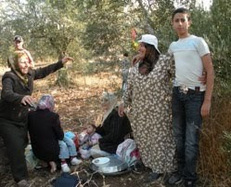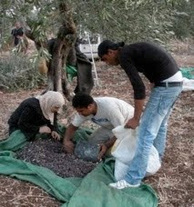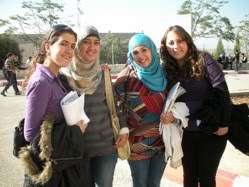 If I hadn’t been focusing on children affected by HIV & AIDS in recent years, I would probably be spending my passion on Arab Christian children, caught between Israelis (who are often convinced that all Arabs are terrorists) and Muslims (who sometimes assume that Christians are sympathetic to Zionists.) Most only want to get on with their lives. The long-standing Christian population of the Middle East has been draining away as featured in a recent National Geographic article.  Marston and the others loved the work, the picnics in the grove and evening meals on the floor using bread in place of forks or spoons. But “there is a dark side,” she writes. “The harvest was very poor this year—a natural occurrence, but people will be hard-hit financially, since olive oil is virtually their only source of income. Also, although this family's trees have not been attacked and destroyed by Israeli settlers or the Israeli apartheid wall (which is built largely on Palestinian land), the people live in constant fear that it may happen someday.” Marston was horrified by the Wall/Fence. “Although the fence is not as ugly as the Wall, it is almost as awful, because it takes up so much of the Palestinians' land, and they can't do anything about it. The settlements are growing constantly. When Obama tried to get a freeze on new construction, he was virtually ignored by the Israeli government. The theft of the Palestinians' water (it all comes from underground aquifers, which Palestinians are not allowed to drill deeply enough to reach) goes on apace. Palestinians' houses get bulldozed for any pretext, and in parts of East Jerusalem families are forced out of their homes and have to watch while Israeli families move in.” [Coming from South Africa, this sounds eerily familiar. LH] “What are the Palestinians doing to resist?” Marston asks rhetorically. “They are putting primary focus on their people, especially the younger generation: education, and cultural pride; preservation of Palestinian culture and accurate awareness of Palestinian history. Keeping going: that is the main form their resistance takes. But people talk worriedly about the possibility of another intifada ("uprising," literally "throwing off"). Conditions are indisputably getting worse all the time, and the refusal of the US government—both administration and Congress—to hold Israel accountable is, in my view, a dreadful sign. I'm speaking specifically about the rude rejection of the Goldstone Report on Israel's war on the people of the Gaza strip, which started just a year ago.” Marston came back more pessimistic about the chances of a peaceful resolution—with justice and security for all—than she has ever been before. After the tour, Marston spent five busy days in Ramallah, speaking to students and teachers at two universities, plus other groups of educators and writers. She even spoke to kids at a refugee camp. Most of the talks focused on her collection of short stories Santa Claus in Baghdad and Other Stories about Teens in the Arab World. Elsa Marston, a children’s author friend of mine who has written extensively about the Middle East, traveled to the West Bank in October and November with a small group exploring possibilities for a documentary. This blog is an edited version of a report she made to the Indiana chapter of the Society of Children’s Book Writers and Illustrators (SCBWI) in an e-mail dated December 8, 2009. Politically you may or may not agree with her conclusions, but the experiences of the people she met should not be ignored. By arrangement of the Siraj Center, Marston’s group stayed with a family in a remote village, helping with their olive harvest. Marston describes herself as being “of a certain age,” which I happen to know is older than I am. Nevertheless, she slept on a thin mattress on the floor and took baths by sloshing water from a bucket of cold water mixed with a kettle of hot water heated on a gas burner on the kitchen counter. “On the other hand,” Marston writes, “just about every family in Palestine has a computer—however old and creaky—and internet access, an essential for keeping in touch with the world outside the virtual prison they live in.”  At the Tamer Institute in Ramallah she gave a workshop for local writers. Marston says, “This organization, which was started in the midst of the first intifada as a way to provide some cultural life and emotional stability for young people, won the Astrid Lindgren Memorial Award for 2009. They have published quite a lot of good books for elementary schools, some translated from foreign publications and some written by Palestinian authors, including a few YA books, mostly in Arabic." Marston came away with an enormously positive impression of the Palestinians. She saw no evidence of the Muslim/Christian tensions some of my friends have reported. “Living under appalling restrictions, they are a remarkably patient, civil, good-humored, courteous, and—the word kept coming to my mind—gentle people . . . the exact opposite of the stereotypes by which their adversaries describe them.” Marston plans to write a picture book based on her experiences. My husband has several Arab Christian colleagues for whom he has utmost respect as they attempt to be “salt and light” in such a difficult situation. At this Christmas season, I urge you to keep the people of modern Bethlehem in your prayers.
0 Comments
Leave a Reply. |
AuthorLeAnne Hardy has lived in six countries on four continents. Her books come out of her cross-cultural experiences and her passion to use story to convey spiritual truths in a form that will permeate lives. Add http://www.leannehardy.net/1/feed to your RSS feed.
To receive an e-mail when I post a new blog, please subscribe.
Categories
All
Archives
November 2022
|
 RSS Feed
RSS Feed